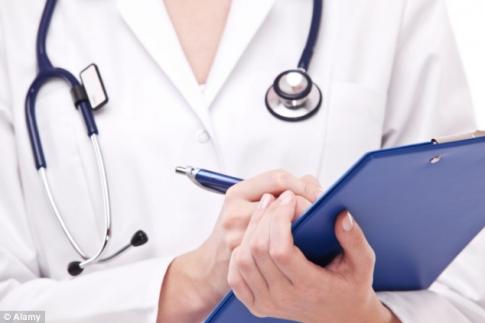When should I see a doctor?

People also differ enormously in how seriously they rate symptoms. If you’re a pastry chef, a sore throat may not trouble you too much but if you’re an operatic tenor, it’s devastating. Likewise, if your father has just died of a heart attack, every twinge of chest pain suddenly assumes huge significance for you.
By Phil Hammond
You feel like death. You phone your GP surgery. You can’t be seen for a week. You get better. You turn up to the appointment anyway. You feel like a time-waster and a fraud. So why bother to have a doctor at all?
Good question. 90pc of our ailments get better if they were left to nature; doctors just like taking the credit for it. But it’s the 10pc you’ve got to worry about. How can you tell if your ailment’s worth an hour in the waiting room breathing other people’s germs? Here are a few pointers ...
Probability
If you live in a country that disposes of its sewerage properly, you’re likely to shuffle off this mortal coil at the age of eighty. The probability that you suffer an acute, life threatening illness long before then is low. Helpful to remember when you first spot an issue and immediately self-diagnose it as inoperable cancer.
Appendicitis, twisted testicles and testicular tumours are all more likely when you’re young and shouldn’t be left alone, so keep a sharp eye out for those.
Why people consult
Most people don’t have a science degree and, judging by burgeoning popularity of complementary medicine, at least half the population rate time and kindness as highly as scientific evidence.
Most men don’t base decisions to visit the doctor on the statistical likelihood of symptoms clearing up on their own but on a whole host of extraneous factors e.g. “My girlfriend made me come”, “I’m going on holiday tomorrow”, “I fancy a month off work”, “I’m keeping the dog awake” or “I was on the way to Safeways and I just popped in for a chat.”
People also differ enormously in how seriously they rate symptoms. If you’re a pastry chef, a sore throat may not trouble you too much but if you’re an operatic tenor, it’s devastating. Likewise, if your father has just died of a heart attack, every twinge of chest pain suddenly assumes huge significance for you.
The bottom line is that everyone’s health beliefs, perceived vulnerabilities and pain thresholds differ, and GPs spend much of their lives listening and dishing out information and reassurance. This isn’t a waste of our time, but part of the job.
The inverse care law
People who don’t need treatment get it, and people who do need it don’t. Why do some men consult a doctor every time their nose drips while others sit at home with their testicular lump until it’s too large or painful to ignore?
Fear is usually what prevents people from coming forward, either of doctors or dying. If someone can’t breathe or their heart stops, it’s reasonably obvious that professional help is required. But it’s the conditions that aren’t immediately life threatening but could become so if left alone that are harder to deal with. “I was hoping if I left it alone, it would go away” is a common epitaph.
If in doubt, check it out.
Obvious Emergencies
These usually involve the sudden loss of something (a limb, vision, speech or the ability to breathe) or the sudden onset of something (chest or abdominal pain). It may be a while before the ambulance arrives and the appropriate use of first aid can be life-saving.
The St John Ambulance publishes an excellent manual and app but these skills are best learnt by doing, and the website will direct you to a local course.
What are you going to do when your girlfriend chokes on a kumquat?
When to call your doctor
Most “emergency” call-outs are nothing of the sort and doctors appreciate it if you have a stab at self-help measures first. Bed rest, plenty of fluids and simple painkillers will see off all but the most truculent virus.
If your illness shows no signs of improvement after 48 hours despite this or your temperature exceeds 40C (with the thermometer out of the coffee), then you have a case for calling a GP.
Things that must not be left alone
This list isn’t exhaustive. At first glance, it appears to have been compiled by the Professor of Common Sense at the University of the Blindingly Obvious. Unfortunately, common sense is a rare commodity ...
Lumps, especially hard irregular ones in the testicles, neck or under the arms
Blood from any orifice (coughing it, vomiting it, peeing it, pooing it)
Shortness of breath and all breathing difficulties
Delusions and hallucinations (e.g. hearing voices)
Unprotected intercourse (morning after pills for your partner must be started within 120 hours post ejaculation, but the sooner the better)
Unexplained blackouts
Unexplained loss of weight or appetite
Any problem with the waterworks
Pus from and sores on the penis (don’t use it until it’s been checked out)
Unexplained changes in bowel habit (i.e. not vindaloo induced)
Severe pain anywhere, especially chest, abdomen and testicles
Muscle weakness, wasting and clumsiness
Sober speech slurring
Suspicious moles (Changes of size, shape, colour, texture. Bleeding and itching.)
Anything picked up abroad
Troublesome symptoms that persist beyond a week
Persistent feelings of anxiety, depression or self-harm
Anything that’s making your life a misery and might conceivably benefit from a visit to the doctor (i.e. not the neighbour’s rottweiler or your dental problems). /Agencies




 del.icio.us
del.icio.us Digg
Digg

Post your comment